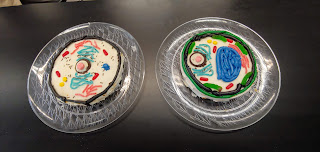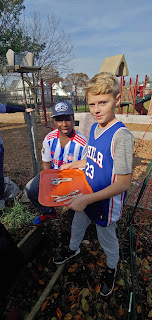Sixth grade students broke into teams to tackle the four spheres of Earth's systems: the hydrosphere (water), the geosphere (solid earth), the atmosphere (air), and the biosphere (life). They researched the way these systems interact with each other to create the whole Earth. They will display their work and share it with the HCA community as posters outside the science lab.
The 5th grade is creating food webs found in various ecosystems around the world: the rainforest, the deciduous forest, a coral reef, and a freshwater lake. They will identify producers, 1st, 2nd, and 3rd order consumers, and apex predators in their project. Students first created a prototype poster after researching food webs in their respective ecosystems. They will make a final poster demonstrating the flow of energy through each system that will also be shared with HCA outside the lab..
It was Cell Cake week in 7th grade! The students designed plant and animal cells using cakes and candy decorations to represent the organelles found in each type. Stevie, Kadin, Will, and Aidan each contributed "organelles" to put on the cake while properly identifying their location and function in the cell. After building the cake, it was enjoyed by the class and shared with others...well done, Grade 7!
HAPPY THANKSGIVING!




















































